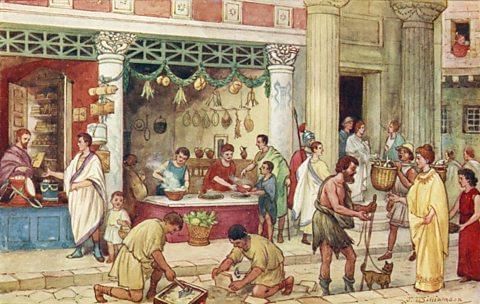Crime and Punishment in Ancient Rome - Year 6 PDF Download
Watch: Punishing crimes in Ancient Rome
To play this video you need to enable JavaScript in your browser.
This video cannot be played.
Watch this video to discover how crimes were punished in Ancient Rome.
BELLS RING
BELLS RINGDRUMS SOUND
DRUMS SOUNDMan: So, you think you can steal from the temple? Seize him, but keep him alive. I want to present him to the magistrate.
Man:Magistrate: What is the charge against him?
Magistrate:Temple owner: This man was caught stealing from my temple. We apprehended him while he was trying to leave with offerings dedicated to Jupiter. This is all recorded in the temple logs.
Temple owner:Magistrate: What do you have to say for your actions?
Magistrate:Man: I apologize; I only wished to better my family's situation. I had to leave the army due to my injuries.
Man:Magistrate: Stealing from a temple is akin to robbing the gods.
Magistrate:Temple owner: Impose the harshest punishment possible. If it becomes known that light penalties are given for temple theft, many will attempt it.
Temple owner:Magistrate: Your guilt is clear. I sentence you to repay the temple three times the worth of the stolen offerings.
Magistrate:Man: I cannot pay that. I have no money.
Man:Magistrate: If you cannot pay the fine, your only alternative is death.
Magistrate:Man: No!
Man:Magistrate: So, what shall it be? Shall I pour hot lead down your throat? No, that's a waste of metal. I sentence you to be thrown off a cliff.
Magistrate:Man: No!
Man:Back to top
Life under Roman rule - The Roman Empire existed from approximately 700 BC to 476 AD.
- At its peak, during Emperor Trajan in 117 AD, Rome governed over 45 million individuals across regions in Europe, North Africa, and Asia.
- Its military was the most formidable globally. As it conquered new territories, the city of Rome expanded from a small town into a vast capital.

Image caption,
With more than one million residents, ancient Rome was often a filthy and perilous environment, characterized by a network of narrow streets and impoverished neighborhoods.
Many crimes similar to those today, such as murder and theft, were prevalent.
The Roman Empire recognized numerous slaves and free citizens, often treating them differently when they committed offenses.
Did you know?

The Roman legal and punishment system has influenced many laws still in use today.
Wearing purple was prohibited unless one was extremely wealthy!
Was there a Roman police force?

During Roman times, there was no formal police force, but a group known as the Vigiles existed.
Approximately 7,000 Vigiles were responsible for addressing crimes such as theft and runaway slaves. They also functioned as a fire brigade and extinguished fires!
In instances of more severe crimes, such as riots, the Vigiles would enlist the help of Roman guards.
If there was a threat to the Emperor, his dedicated protectors, the Praetorian Guard, would intervene.
The Roman Goddess of Justice was named Justitia, and she is depicted holding the scales of justice.
How did the Romans punish people? 
- The Romans structured their punishments to deter future crimes.
- The type of punishment imposed varied based on an individual's social status.
- Whipping and fines were the most commonly applied penalties.
- Wooden shoes were sometimes fitted on prisoners' feet to hinder their ability to escape.
- Enslaved individuals could be compelled to wear a wooden sign around their necks indicating their crime.
- For severe offenses, punishments could include death by crucifixion, being thrown off a cliff, drowning, or even being buried alive. Crucifixion was typically reserved for serious crimes such as insurrections against the empire.
- Over time, punishments in Rome became increasingly brutal.
Activities Activity 1: Compare and contrast
Activity 1: Compare and contrast
Watch the BBC Bitesize for Teachers video regarding life for children in Roman Britain.
Can you identify three differences between your life and theirs during that period?
3 differencesConsider looking out for:
- Clothing styles
- Education systems
- Occupations held by individuals
- Any other notable observations
To play this video you need to enable JavaScript in your browser.
This video cannot be played.
Children in Roman Britain from BBC Teach
Activity 2: Roman crime quiz
Horrible Histories: Raid and Trade game
Horrible Histories: Raid and Trade game
Horrible Histories: Raid and Trade game
Play Horrible Histories: Raid and Trade KS2 History

More on Crime and punishment
Discover more by exploring different topics.
Crime and Punishment in Anglo-Saxon times
- count2 of 5

- count2 of 5
Crime and Punishment in Tudor times













